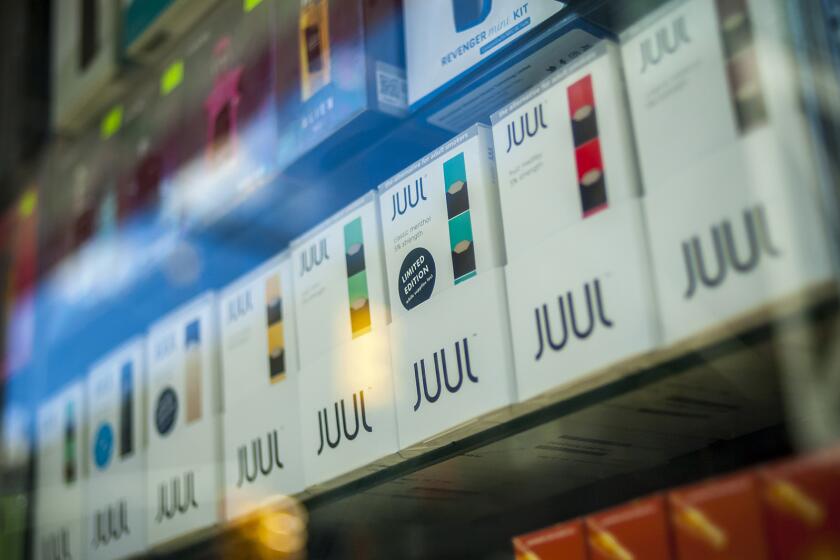FTC orders Juul and 5 other vaping companies to hand over information
Federal regulators have ordered Juul Labs Inc. and five other vaping companies to hand over information about how they market e-cigarettes, the government’s latest move targeting the industry.
The announcement Thursday from the Federal Trade Commission comes amid a nationwide crackdown on e-cigarettes as politicians and health authorities try to reverse an explosion of vaping by U.S. teenagers.
The FTC said it wanted to “better understand” vaping sales and promotional practices, including e-cigarette giveaways, online influencer programs and marketing on college campuses. Those techniques are also at the center of several state and federal investigations into whether Juul’s early viral marketing efforts helped spark the surge in teen vaping.
San Francisco-based Juul announced last week that it would cease all advertising of its small, discreet vaping devices. A company spokesman said Thursday in a statement: “We will fully cooperate and are focused on earning the trust of regulators, policymakers and other stakeholders.”
Northern California district attorney opens an investigation into e-cigarette company Juul Labs to look into what she called its “false” advertising.
Federal law prohibits traditional tobacco companies from numerous sales tactics, including giving away cigarettes, sponsoring sports events and advertising on television, radio, public transportation and billboards. But those laws don’t apply to e-cigarettes, which launched in the United States in 2007.
More than 1 in 4 high school students reported having vaped in the last month, according to the latest government survey data. Top health officials have called the trend an epidemic that risks addicting a generation of young people to nicotine.
Besides Juul, the government also is seeking information from R.J. Reynolds Vapor Co., Fontem US, Logic Technology Development, Nu Mark and NJOY. Regulators want to review company materials beginning in 2015.
Besieged by criticism, Juul announced a series of surprise concessions last week: halting all advertising, replacing its chief executive and pledging not to lobby against a planned federal ban on e-cigarette flavors. Juul already faces multiple investigations from Congress, the Food and Drug Administration and several state attorneys general.
The privately held company controls nearly 70% of the U.S. retail market for e-cigarettes and has become a cultural phenomenon with the success of its high-nicotine, flavored e-cigarette pods.
Camouflaged vaping devices have teachers and parents struggling to monitor the usage of a product that has surged in popularity among high school-aged kids.
Most experts agree that e-cigarette vapor is less harmful than cigarette smoke because it doesn’t contain most of the cancer-causing chemicals in burning tobacco.
A recent outbreak of serious lung illness has afflicted more than 1,000 people in the U.S. and has brought additional scrutiny to the e-cigarette industry.
The Centers for Disease Control and Prevention said the illnesses mostly involved people who said they vaped THC, the high-inducing chemical found in marijuana, though some vaped both THC and nicotine and some vaped only nicotine. Health inspectors have not ruled out any vaping products and are encouraging people to avoid vaping until the cause of the illnesses is discovered.
More to Read
Inside the business of entertainment
The Wide Shot brings you news, analysis and insights on everything from streaming wars to production — and what it all means for the future.
You may occasionally receive promotional content from the Los Angeles Times.











